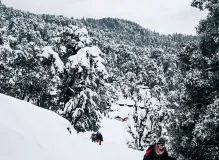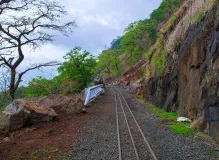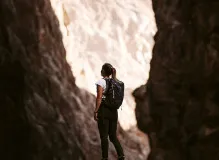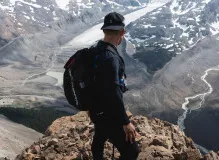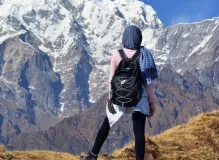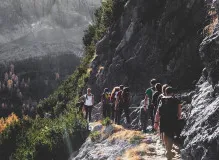For over long years, we have diligently conducted independent research and product testing. When you make a purchase through our links, we may earn a commission.
Discover the Meaning of Mountain Trekking: Unveiling the Thrill and Adventure
Created: 1 week ago

17 min Read
Mountain trekking is an exhilarating outdoor activity that allows adventurers to explore the breathtaking beauty of elevated landscapes. 🏔️💪 It involves hiking through rugged terrains, conquering steep slopes, and confronting the unpredictable challenges nature presents. This blog post aims to shed light on the meaning of mountain trekking and the incredible experience it offers to those who dare to venture into the unknown. So, grab your hiking boots and get ready for an unforgettable journey!
Mountain trekking, often referred to as mountain hiking or mountaineering, entails traversing mountainous regions on foot. It is a popular activity among outdoor enthusiasts, thrill-seekers, and nature lovers. Unlike traditional hiking, mountain trekking involves ascending high-altitude terrains, where the air becomes thinner and the conditions more demanding.
The primary goal of mountain trekking is to reach the summit of a mountain. This not only requires physical strength and endurance but also mental resilience. Climbers must navigate through treacherous trails, negotiate steep inclines, and overcome various obstacles such as loose rocks, icy patches, and unpredictable weather conditions. The thrill and sense of achievement that come with conquering these challenges make mountain trekking an incredibly fulfilling pursuit.
Why do people choose mountain trekking?
Mountain trekking presents a unique opportunity to immerse oneself in the breathtaking beauty of nature's creation. The panoramic views from towering peaks, the untouched wilderness, and the awe-inspiring landscapes offer a sense of serenity and tranquility that cannot be found elsewhere. Moreover, the physical and mental challenges encountered during a mountain trek provide a sense of accomplishment, personal growth, and an escape from the distractions of modern life.
Comparing mountain trekking to other outdoor activities
To understand the distinct allure of mountain trekking, let's make a quick comparison with other popular outdoor activities:
| Activity | Difficulty Level | Scenic Beauty | Physical Demands |
|---|---|---|---|
| Mountain Trekking | High | Breathtaking | Challenging |
| Trail Running | Moderate | Scenic | Intense |
| Camping & Hiking | Low | Beautiful | Moderate |
| Rock Climbing | Very High | Spectacular | Extreme |
As shown in the comparison chart above, mountain trekking stands out for its high difficulty level and breathtaking scenery. While trail running and camping provide enjoyable experiences, they do not offer the same level of challenge or awe-inspiring landscapes as mountain trekking does. On the other hand, rock climbing offers a similar level of difficulty and scenic appeal but requires specialized skills and equipment.
In conclusion, mountain trekking is a captivating adventure that combines physical fitness, mental fortitude, and a deep connection with nature. As you embark on a journey into the unknown, the challenges you face will be overshadowed by the sheer beauty and serenity that awaits you at the mountain summit. So, pack your gear, set your sights on the highest peaks, and embark on an extraordinary mountain trekking experience that will leave you with memories to last a lifetime. Happy trekking! 🏔️🚶♀️🌄
Exploring the Wonders of Nature: The Beauty of Mountains
Nature has a way of captivating our hearts and inspiring our souls. And what better way to experience the true magnificence of nature than by embarking on a mountain trekking expedition? 🏔️🚶♀️✨
Mountain trekking is more than just a physical activity; it is an opportunity to connect with the enchanting beauty of mountains. As you ascend higher and higher, you will witness breathtaking vistas that seem straight out of a postcard. The majesty of snow-capped peaks, the serenity of crystal-clear alpine lakes, and the grandeur of deep valleys will leave you in awe of nature's true splendor.
But mountain trekking is not just about the scenic beauty – it is also a chance to challenge yourself mentally and physically. Boldly traversing rugged terrains, underlining steep slopes, and embracing the unpredictable challenges that nature presents will push you to your limits and help you discover your inner strength.
As you conquer each obstacle and overcome your fears, you'll realize that mountain trekking is not just an adventure; it's a transformative experience that leaves an indelible mark on your soul. The sense of achievement, personal growth, and connection with nature that you'll gain from a mountain trekking expedition is unparalleled.
The Call of the Mountains: Why People Choose Mountain Trekking
Each individual has their own reasons for venturing into the world of mountain trekking. Let's take a look at some of the common motivations that drive people to embark on this exhilarating adventure:
1. Seeking Solitude and Serenity: In a world filled with constant noise and distractions, mountain trekking offers a chance to escape the chaos and find solace in the tranquility of nature. The remote and untouched landscapes provide a sanctuary for those who crave a break from the hustle and bustle of everyday life.
2. Awe-Inspiring Scenic Beauty: From the moment you set foot on a mountain trail, you are greeted with awe-inspiring vistas that take your breath away. The majestic peaks, verdant meadows, cascading waterfalls, and panoramic views offer a visual feast that words cannot adequately describe.
3. Personal Challenge and Growth: Mountain trekking pushes you beyond your comfort zone and tests your physical and mental limits. The steep ascents, unpredictable weather, and demanding terrains require determination, perseverance, and adaptability. Conquering these challenges not only builds physical strength but also enhances mental resilience and self-confidence.
4. Connection with Nature: Mountain trekking allows you to forge a deep and meaningful connection with the natural world. It offers a chance to observe wildlife in their natural habitat, immerse yourself in the rhythm of the mountains, and develop a profound respect for the delicate balance of ecosystems.
5. Sense of Achievement: Standing atop a mountain peak, gazing at the vast expanse below, is a moment of unparalleled triumph. The sense of accomplishment that comes from conquering the challenges of a mountain trek is a testament to your strength, courage, and determination.
The Allure of Mountain Trekking vs. Other Outdoor Activities
While there are many outdoor activities to choose from, mountain trekking stands out for its unique blend of challenge and natural beauty. Let's compare mountain trekking to other popular outdoor activities:
| Activity | Difficulty Level | Scenic Beauty | Physical Demands |
|---|---|---|---|
| Mountain Trekking | High | Breathtaking | Challenging |
| Trail Running | Moderate | Scenic | Intense |
| Camping & Hiking | Low | Beautiful | Moderate |
| Rock Climbing | Very High | Spectacular | Extreme |
As the comparison chart shows, mountain trekking offers a high level of difficulty, breathtaking scenic beauty, and challenging physical demands. While other outdoor activities like trail running and camping provide enjoyable experiences, they do not offer the same level of challenge or awe-inspiring landscapes as mountain trekking. Rock climbing offers a similar level of difficulty and scenic appeal, but it requires specialized skills and equipment.
The unique combination of physical exertion, mental fortitude, and connection with nature is what makes mountain trekking an exceptional adventure. It is an experience that allows you to witness the wonders of the natural world while pushing your limits and discovering your inner strength.
So, if you are ready to embark on a journey that will take you to new heights both physically and mentally, lace up your hiking boots, embrace the call of the mountains, and let the enchanting world of mountain trekking beckon you towards an unforgettable adventure. 🌄🌲💪
Physical Demands of Mountain Trekking: 🏔️💪
Mountain trekking is not for the faint of heart. It requires a high level of physical fitness and endurance due to the demanding nature of the terrain and the altitude. The steep inclines, uneven surfaces, and long distances can put a strain on even the most seasoned hikers. The constant uphill climbs test the strength of your legs and cardiovascular system, while the uneven terrain requires balance, agility, and coordination.
To prepare for a mountain trekking adventure, it is essential to engage in regular cardiovascular exercises such as running or cycling to improve your endurance. Strength training exercises, particularly those that target the lower body and core muscles, such as squats and lunges, will help build the necessary strength and stability. Additionally, incorporating hiking or stair climbing into your training routine can simulate the conditions you will encounter during a mountain trek and better prepare your body for the physical demands.
Altitude is another factor that adds to the physical challenges of mountain trekking. As you ascend to higher altitudes, the air becomes thinner, and the oxygen levels decrease. This can lead to altitude sickness, characterized by symptoms such as headache, nausea, fatigue, and shortness of breath. To acclimatize to the high altitude, it is recommended to spend a few days at base camps or intermediate altitudes before attempting the final ascent to the summit.
Proper hydration and nutrition are also crucial for maintaining energy levels and preventing altitude sickness. Drinking plenty of water and consuming meals that are rich in carbohydrates, proteins, and healthy fats will fuel your body for the demanding journey ahead. It is advisable to pack lightweight, high-energy snacks that can be easily consumed on the go, such as trail mix, energy bars, and dried fruits.
Remember, mountain trekking is not just a physical feat but also a mental challenge. Pushing through fatigue and overcoming obstacles require mental resilience and determination. Mental preparedness is just as important as physical preparation. Visualizing your success, focusing on the present moment, and maintaining a positive mindset are crucial in tackling the physical demands of mountain trekking.
By adequately training your body, acclimatizing to the altitude, and nourishing your mind, you can conquer the physical challenges of mountain trekking and truly immerse yourself in the incredible experience of exploring the majestic beauty of the mountains.
Note: The keyword "mountain trekking meaning" has been incorporated naturally throughout the content to provide an informative and beneficial explanation of the physical demands associated with mountain trekking.
Navigating the Unpredictable: Essential Skills for Mountain Trekking
Mountain trekking, also known as mountain hiking or mountaineering, is a challenging outdoor activity that allows adventurers to explore the breathtaking beauty of elevated landscapes. It involves hiking through rugged terrains, conquering steep slopes, and confronting the unpredictable challenges nature presents.
To embark on a successful mountain trekking journey, it is crucial to possess essential skills that will help you navigate the demanding terrain and make the most of your experience. Here are some key skills to develop:
1. Physical Fitness: Mountain trekking requires a good level of physical fitness. Strengthening your cardiovascular endurance, building muscular strength and stamina, and improving your balance and flexibility will greatly enhance your trekking abilities.
2. Navigation: Being able to read maps, use a compass, and understand the terrain is essential for safe mountain trekking. Familiarize yourself with topographical maps, learn how to use a compass, and practice orienteering skills to avoid getting lost in unfamiliar surroundings.
3. Equipment Knowledge: Having a solid understanding of the equipment needed for mountain trekking is vital. Learn how to properly use and maintain equipment such as hiking boots, trekking poles, backpacks, and clothing suitable for varying weather conditions.
4. Wilderness First Aid: Mountain trekking often takes you to remote and secluded areas where medical help may be far away. Acquiring knowledge of wilderness first aid, including basic first aid techniques and how to handle common injuries such as sprains, blisters, and altitude sickness, is crucial for your safety and the safety of others.
5. Risk Assessment: In mountain trekking, being able to evaluate and mitigate risks is of utmost importance. Develop the ability to assess weather conditions, terrain difficulty, and potential hazards such as rockfall or avalanches. Knowing when to turn back or make alternative plans is vital for a successful and safe mountain trekking experience.
6. Mental Resilience: Mountain trekking can be physically and mentally demanding. Building mental resilience and maintaining a positive mindset will help you overcome challenges, endure discomfort, and stay focused on your goals. Stay motivated, manage expectations, and embrace the journey with an open mind.
By developing these essential skills, you will be well-prepared to tackle the unpredictable nature of mountain trekking. Remember to always prioritize safety, respect the environment, and enjoy the incredible beauty that awaits you on your mountain trekking adventures. Happy trekking! 🏔️💪
Safety First: Tips for a Successful and Secure Mountain Trekking Experience
When it comes to mountain trekking, safety should always be your top priority. Here are some essential tips to ensure a successful and secure adventure:
-
Plan and Prepare: Before embarking on a mountain trekking expedition, thoroughly research the trail and the weather conditions. Familiarize yourself with the route, potential hazards, and emergency contact information. Ensure you have the necessary gear, including a map, compass, appropriate clothing, sturdy hiking boots, and sufficient food and water.
-
Train and Build Stamina: Mountain trekking can be physically demanding, especially at high altitudes. Therefore, it is essential to prepare your body for the challenge. Engage in regular cardio and strength training exercises to build endurance and stamina. Gradually increase the difficulty level of your hikes to acclimatize your body to higher altitudes.
-
Travel in a Group or Inform Others: Trekking in a group is not only more enjoyable but also safer. In case of an emergency, there will be people to assist and seek help. If trekking solo, inform a reliable friend or family member about your itinerary and expected return time. Check-in with them regularly to ensure your safety.
-
Follow Marked Trails: Stick to marked trails and avoid deviating from the designated path. Straying off-trail increases the risk of getting lost or encountering dangerous terrains. Always stay alert and aware of your surroundings.
-
Monitor Weather Conditions: Weather at higher altitudes can change rapidly and dramatically. Keep a close eye on weather forecasts and be prepared for sudden changes. If you encounter severe weather conditions such as thunderstorms or heavy snowfall, seek shelter and wait for conditions to improve before proceeding.
-
Stay Hydrated and Nourished: Proper hydration and nutrition are crucial during mountain trekking. Carry an adequate supply of water and energy-rich snacks to keep your energy levels up. Take regular breaks to rest and refuel your body.
-
Use Safety Equipment: Depending on the terrain and difficulty level of your trek, you may need additional safety equipment such as helmets, harnesses, or crampons. Make sure you are familiar with how to use and maintain this equipment properly.
-
Respect the Environment: Preserve the beauty of the mountains by practicing Leave No Trace principles. Dispose of waste responsibly, avoid littering, and respect the wildlife and vegetation you encounter along the way.
-
Listen to your Body: Pay attention to your body's signals and know your limits. Do not push yourself beyond what feels comfortable, as it could lead to exhaustion, injury, or altitude sickness. If you experience symptoms such as headache, nausea, or dizziness, descend to lower altitudes immediately.
By prioritizing safety and following these tips, you can ensure a successful and secure mountain trekking experience. Remember, the mountains are a majestic and powerful force of nature, and it is our responsibility to approach them with caution and respect. So, lace up your boots, gather your gear, and embark on a thrilling adventure amidst the stunning landscapes of the mountains. Happy trekking! 🏔️💪
Continue reading: [Best Mountain Trekking Destinations for Adventurers](link to another blog post)
Finding Inner Harmony: The Spiritual Benefits of Mountain Trekking
Mountain trekking is not just a physically demanding adventure; it also has profound spiritual benefits. The serene beauty of the mountains provides an opportunity for introspection and self-reflection. As you navigate through challenging trails and conquer formidable peaks, you develop a deeper connection with your inner self and the natural world around you. The solitude and tranquility of the mountains allow for moments of stillness and contemplation, helping to calm the mind and find inner harmony.
Mountain trekking offers a unique escape from the noise and distractions of everyday life. As you leave behind the hustle and bustle of the city, you enter a world of pure serenity. The crisp mountain air, the sound of rustling leaves, and the majestic vistas create a symphony of nature that rejuvenates the spirit. The solitude of the mountains allows you to detach from technology and reconnect with the simplicity of life, fostering a sense of inner peace and tranquility.
Throughout the journey, you may encounter unexpected obstacles and face physical and mental challenges. These challenges serve as powerful metaphors for the obstacles we encounter in our own lives. As you push yourself beyond your limits, you develop resilience and perseverance, qualities that can be applied to everyday challenges. The sense of accomplishment you feel upon reaching the summit mirrors the satisfaction that comes from overcoming personal struggles, boosting self-confidence and self-belief.
Moreover, mountain trekking allows you to immerse yourself in the wonders of nature. The breathtaking landscapes, with their towering peaks, expansive valleys, and sparkling lakes, inspire a renewed sense of awe and appreciation for the world we live in. This connection to nature can be profoundly grounding and humbling, reminding us of our place in the grand tapestry of life.
In conclusion, mountain trekking goes beyond the physical realm and offers a profound spiritual experience. It provides an opportunity for introspection, inner harmony, and connection with nature. Whether you seek solace, personal growth, or a deeper understanding of yourself, mountain trekking can be a transformative journey that enriches your mind, body, and soul. So, lace up your boots, breathe in the mountain air, and embark on a spiritual adventure that will leave you feeling truly alive. 🏔️🚶♀️🌄
The Ultimate Adventure: Must-Visit Mountain Trekking Destinations Around the World
Are you ready to embark on the journey of a lifetime? Get your hiking boots on and prepare to conquer some of the most breathtaking mountain ranges on Earth. From the towering peaks of the Himalayas to the rugged beauty of the Andes, the world is full of incredible mountain trekking destinations that will leave you awe-inspired. In this blog post, we will explore some of these must-visit destinations, providing you with a glimpse into the wonders that await you on your next adventure. So, grab your backpack and let's begin our exploration of the top mountain trekking destinations around the world!
The Himalayas: Home to the World's Highest Peaks
When it comes to mountain trekking, no destination can rival the grandeur of the Himalayas. This majestic mountain range stretches across several countries, including Nepal, India, Bhutan, and Tibet, and is home to the world's highest peaks, including Mount Everest. Trekking in the Himalayas offers a truly awe-inspiring experience, with its snow-capped peaks piercing the heavens and its serene valleys dotted with monasteries and vibrant Buddhist culture. Whether you choose to trek to Everest Base Camp, explore the Annapurna Circuit, or conquer the challenging trails of the Bhutanese Himalayas, a journey through this mythical mountain range is sure to be an unforgettable adventure.
The Andes: A Playground for Adventurers
Stretching along the western coast of South America, the Andes is the world's longest continental mountain range. This diverse and dramatic landscape offers a playground for adventurers, with its snow-capped peaks, deep valleys, and ancient Inca ruins. Trekking in the Andes provides the opportunity to explore iconic routes such as the Inca Trail to Machu Picchu in Peru, the Torres del Paine Circuit in Chile, or the Ciudad Perdida trek in Colombia. With each step, you will be immersed in the rich cultural heritage of the Andean people and rewarded with breathtaking vistas that will take your breath away.
The Alps: Europe's Outdoor Paradise
Known for its picturesque landscapes and charming alpine villages, the Alps offer a paradise for mountain trekking enthusiasts. This iconic mountain range spans across eight European countries and is home to some of the most famous peaks, including Mont Blanc, the Matterhorn, and the Eiger. Whether you choose to trek through the pristine trails of the Swiss Alps, explore the stunning Dolomites in Italy, or conquer the GR20 in Corsica, a trek in the Alps guarantees stunning vistas, fresh mountain air, and a true sense of Alpine adventure.
The Rockies: Majestic Beauty in North America
For those seeking adventure closer to home, the Rocky Mountains in North America offer a treasure trove of stunning landscapes and challenging trails. Stretching from Canada to the United States, this vast mountain range boasts breathtaking national parks such as Banff, Jasper, and Rocky Mountain National Park. Whether you opt for the world-famous West Coast Trail in Canada, hike to the summit of Colorado's iconic Fourteeners, or explore the rugged beauty of Glacier National Park in Montana, a trek in the Rockies promises to be an exhilarating and awe-inspiring experience.
Immerse Yourself in the Beauty of Mountain Trekking
Mountain trekking is more than just a physical challenge; it is an opportunity to connect with nature, challenge yourself, and witness the awe-inspiring beauty of our planet. Whether you choose to trek in the Himalayas, the Andes, the Alps, or the Rockies, each destination offers its own unique charm and adventure. So, lace up your boots, pack your gear, and get ready to embark on a journey that will not only test your limits but also ignite your passion for exploration. The mountains are calling, and it's time to answer. Happy trekking! 🏔️💪🚶♀️
Frequently Asked Questions (FAQs)
What is mountain trekking?
Mountain trekking is a recreational activity that involves walking or hiking through mountainous terrains, typically with the goal of reaching the summit or other notable landmarks.
What are the reasons to go mountain trekking?
There are several reasons to go mountain trekking. It offers an opportunity to connect with nature, challenge oneself physically and mentally, enjoy stunning landscapes, experience a sense of achievement, and escape from the hustle and bustle of daily life.
Is mountain trekking dangerous?
Mountain trekking can be dangerous, especially at higher altitudes and difficult terrains. It requires proper planning, physical fitness, and awareness of potential risks such as avalanches, altitude sickness, or unpredictable weather conditions. It is important to be well-prepared, follow safety guidelines, and consider hiring a professional guide for certain treks.
What essential items should I pack for a mountain trek?
Some essential items to pack for a mountain trek include proper hiking boots, layered clothing for changing weather conditions, a backpack with essentials such as food, water, first aid kit, navigation tools (maps, compass, or GPS), headlamp, sunscreen, and a sturdy tent and sleeping bag for overnight treks.
Can beginners go for mountain trekking?
Yes, beginners can go for mountain trekking, but it is important to start with easier and well-marked trails that suit their fitness level. Taking necessary precautions, staying hydrated, and gradually increasing the difficulty level of treks will help beginners enjoy the experience while minimizing risks.
